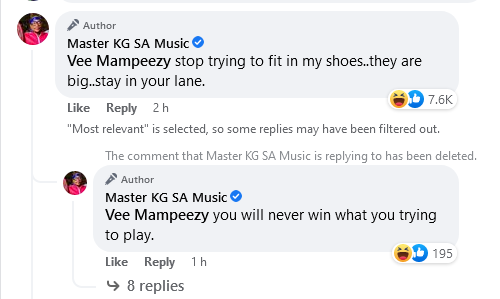Makhadzi Catches Smoke As Botswana Power Couple is Headed for Divorce

Makhadzi Catches Smoke As Botswana Power Couple is Headed for Divorce. It goes without saying that Makhadzi has a lot of fans in Botswana. She has been having quite a number of sold out shows in the neighboring country, and they can’t seem to get enough of her.
The multi-award winning musician recently linked with one of Botswana’s prominent personalities, Vee Mampeezy. The two stars came up with a hit song titled “Ukondelela,”. Even before the song, the two were close, and shared the stage every now and then.
Sadly for Vee, whose real name is Odirile Sento, his personal life is not as great as his music at the moment. The award wining musician and entrepreneur has filed for divorce, after having been married to socialite Kagiso Sento for eight years. The couple who have two children have been having some problems, but all the time managed to resolve them. This time around though, it looks like it’s over for good.
Many people (mostly from Botswana) who know the couple have dragged Makhadzi into the entanglement. They believe that Vee is filing for divorce because he has fallen in love with the Khokhova hit maker. Since they have been shipping Makhadzi and Vee for the longest time, they do not even want to hear any reasoning.
Master KG, who is Makhadzi’s man has made the situation worse by coming for Vee on Facebook. The two gentlemen are currently dragging each other, but it is not yet clear what the fight is about. Or could they be promoting new music? We remain to see.
“Vee Mampeezy I know you love fame but those moves you making here in South Africa for the past weeks are lame…stop being a lame..you know I respect u, stop trying to fit in my shoes..they are big..stay in your lane,” Master KG lashed out.



In the meantime Makhadzi is going through the most in both Botswana and South African Twitter.




